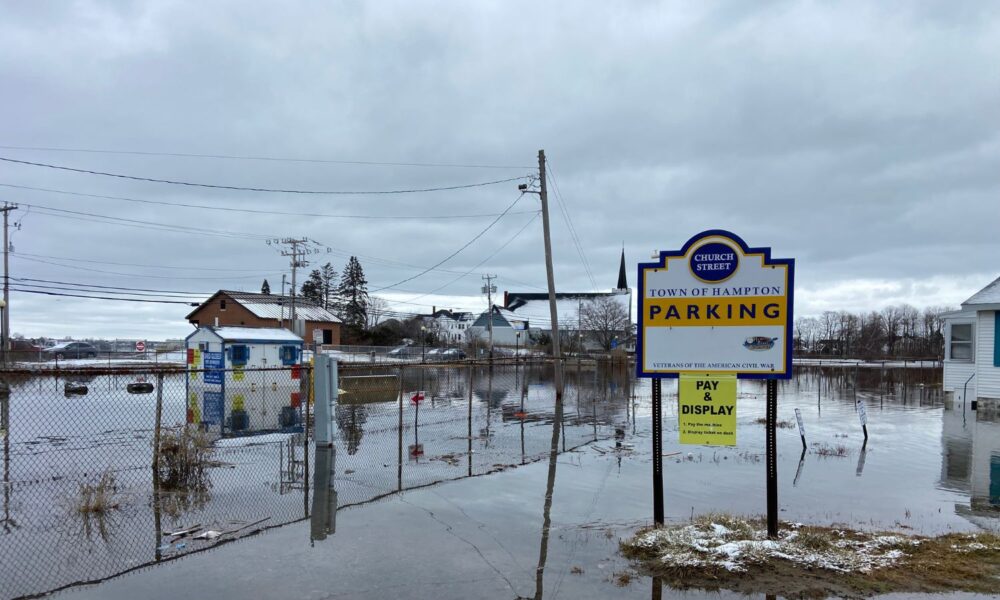In the midst of eye-popping summer precipitation in New England, the Deputy Commissioner at the New Hampshire Insurance Department, D.J. Bettencourt, encouraged New Hampshire residents to go out and buy flood insurance.
Once Governor Chris Sununu’s policy director, Bettencourt was recently nominated to serve as the Department’s next Insurance Commissioner. Earlier in his political career, Bettencourt served as Republican House Majority Leader, and as the public face of the conservative agenda in the state’s House of Representatives.
He is now serving as a subject matter expert—so despite Mr. Bettencourt’s public advocacy for limited government, he must know he’s promoting a federal government program. He understands, presumably, that most private insurance companies do not offer private flood insurance directly, but instead write flood insurance with the National Flood Insurance Program (NFIP) through the government’s Federal Emergency Management Agency (FEMA). He acknowledges, therefore, that a government program exists to address the flood risks today, and may very well address future flood risks faced by New Hampshire residents and businesses.
Energy choices are key to climate resilience—but there’s resistance within state government
Science tells us the extent and degree of future flooding depends on how fast we can reduce heat trapping emissions from the burning of fossil fuels. The 2021 New Hampshire Climate Assessment states unequivocally: “Without significant reduction in atmospheric greenhouse gases (GHG), extreme precipitation events are projected to increase a minimum of 20%, leading to an increase in freshwater flooding regionally.”
In its final report, the 50-member New Hampshire Coastal Risks and Hazards Commission stated, “Although the Commission’s mission and report are focused on adaptation, we recognize that efforts to reduce greenhouse gas emissions and adaptation are intrinsically linked, and therefore support continued action to reduce the drivers of climate change in New Hampshire…” Without reducing emissions, we cannot know the scenarios to which New Hampshire coastal communities are supposed to adapt.
Keeping in mind the science-confirmed connection between impacts and emissions, it is notable to contrast Commissioner Bettencourt’s call to take advantage of a government program with the opinion of a different Sununu appointee who believes government should play no role in mitigating climate risks.
In his confirmation hearing, Jared Chicoine, Sununu’s choice to head the Department of Energy, opined that the private sector is the appropriate place to address climate change. Commissioner Chicoine followed through on his laissez-faire stance with a “laissez-casser” (let it break) Ten-Year Energy Strategy for New Hampshire. This document is a roadmap for the status quo and for climate indifference; a roadmap that traps future generations into future Danger Seasons on steroids.
Be careful what you wish for
To Mr. Chicoine’s point, with respect to the private sector, just how is the private sector doing in addressing climate change?
Sticking with the property insurance sector, the markets are speaking. Insurers use data—not ideology—when making decisions. Allstate and State Farm—among the biggest insurance companies in the country—announced that they would no longer insure new homes in California; costs linked to increased wildfires is one reason for these decisions to abandon the market. An even bleaker picture exists in Florida, where a dozen insurance companies have abandoned homeowners. The costs of increased risks from natural hazards—wildfires, floods and sea level rise—are driving insurers away. (Regulations inhibiting premium increases are blamed as well, though wouldn’t unleashing the free market in this case force thousands of people to abandon and leave their homes?) We are witnessing multiple market failures, beginning with the market’s failure to price climate risks or benefits, and leading to the insurance market’s failure to do the same.
New Hampshire’s 2024 climate action plan: redux, revival or redo?
Yet another agency department head, Department of Environmental Services Commissioner Robert Scott, has applied for a $3 million grant from the federal government to develop a state climate action plan. The state will soon receive this funding (no cost-sharing required), which the department says it will use this fall, winter, and spring for a broad outreach strategy intended to gather feedback from a range of stakeholders, as well as add new employees to do so.
New Hampshire’s 2009 Climate Action Plan is the product of a very diverse and thoughtful steering committee. Never enforced, the plan did succeed in catalyzing interest and additional studies; these and others can serve to inform a new climate action plan:
- 2010 New Hampshire Climate and Public Health Strategic Plan
- 2013 New Hampshire HVAC Load and Savings Research
- 2014 Climate Change and Human Health in New Hampshire
- 2014 New Hampshire Ten Year Energy Strategy (Hassan administration)
- 2015 Climate and Health Adaptation Plan for the Upper Valley
- 2016 New Hampshire Coastal Risks and Hazards Report
- 2016 Climate and Health Adaptation Plan for the Lakes Region
- 2018 and 2021 New Hampshire Ten Year Energy Strategy (Sununu administrations)
- 2020 New Hampshire Ad Hoc Greenhouse Gas Emissions Commission
- 2021 Economic Recovery and Expansion Strategy
- 2021 New Hampshire Climate Assessment
To be a leader is to listen and learn
Insurance Commissioner D.J. Bettencourt, Energy Commissioner Jared Chicoine, and Environmental Services Commissioner Robert Scott should at a minimum review the aforementioned plans and recommendations.
The terms of appointment for all three Commissioners extend into the first term of the next Governor; so it would be wise, necessary even, for Granite Staters expecting climate action to make certain these agency heads acknowledge the latest climate science, heed the recommendations found in these reports, and check their personal opinions at the door.
Moreover, it might make sense for these three Commissioners to involve their peers: the Commissioners of (1) Health and Human Services; (2) Administrative Services; (2) Agriculture Markets and Food; and (4) Safety. I hedge because the Administrative Services Commissioner in his prior role at the Josiah Bartlett Center issued a white paper calling members of the Coastal Risks and Hazards Commission “climate alarmists,” and our Agriculture Commissioner says his department has “no role” in addressing climate.
These three Commissioners should involve lawmakers too, so that leaders in the executive and legislative branches can together learn and understand the science, the serious implications for the state and its people, various emissions reduction opportunities available and potential for positive economic outcomes. But make no mistake: any new climate action plan must be a peoples’ climate plan. It cannot be a plan that reflects the opinions and interests of the powerful.
Hard choices will need to be made this decade—starting right now
Peoples’ welfare must trump the special interests. The monied utilities, wealthy fossil fuel companies, and right-wing think tanks have long influenced the positions and policies brought into the daily work of agency heads and lawmakers.
Forging a meaningful climate plan may be a challenge, given the state legislature narrowly defeated a climate plan bill in the last session. We should all expect—rather, demand—opportunities to provide meaningful input into a state climate action plan. While private-sector innovations will play very important supporting roles, our state’s legislative and executive branches must develop and pass laws and regulations to lay the groundwork for growth in employment in the clean energy sector, and for a safe and adaptable future for people and natural resources.
The state must ensure working-class people, those depending on hourly wages, communities of color—people who have been forced to the margins—are able to access and leverage opportunities for input. In a new climate plan—a roadmap drawn with implementation and accountability—we must see commitments for decisive action, and ambitious targets and timetables.
Governor Sununu, pick up the phone
The common refrain we hear today in Concord is that “New Hampshire can’t make a difference acting on climate.” This is baloney. Almost 40 years ago, acid rain polluting our lakes and forests was a New Hampshire problem demanding a national solution. Congress arrived at a national solution in 1990—in part because New Hampshire led with landmark acid rain legislation five years prior!
We can make a difference. And it starts with state and local governance that is aligned with making people safer, affording us clean energy choices, and spurring economic development consistent with a resilient future.
Building an all-of-government approach to transform New Hampshire from climate laggard to climate leader might start with a simple phone call. After all, the Commissioners all work for the same person: Governor Chris Sununu.

